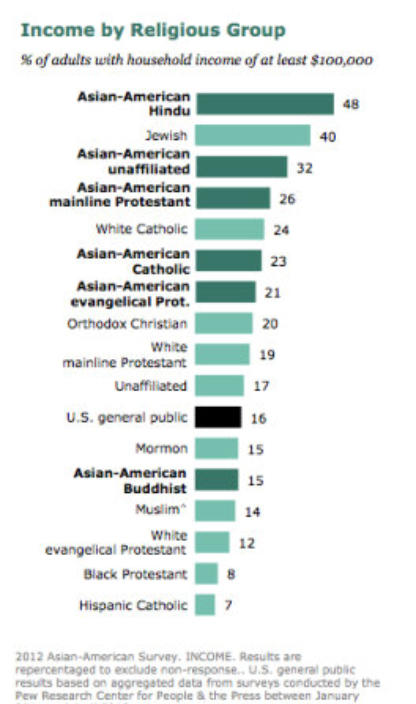Hindu-Americans Rank Top in Education, Income
“






‘Knowledge is power’





WEB PAGES
OUR OFFERING
UPLOADED ITEMS
OUR EMAIL
kri200@womenspowerbook.org
QUESTION
Raise the vol to listen to the
lady airing awe @ the SINGLE author encyclopedia
World’s
encyclopedic
knowledge
compacted
in
your
hand
Hindu-Americans have the highest socioeconomic levels among all religions in
the
United States, according to a new study by the Pew Research Center’s Forum on
Religion and Public Life.
Experts say U.S. immigration policy is the main reason Hindus do so well.
Both the 1965 Immigration Act and the more recent H1-B visa program set the
table for Hindus to succeed. The former encouraged the immigration of
professionals, particularly
doctors and engineers, while
the latter was designed
to encourage the immigration
of highly skilled “guest
workers.”
The number of H1-B visas
issued to Indians grew steadily
in the late 1990s and early
2000s and then spiked again
in 2007. In 2011, according to
the study, India accounted for
more than half of all the H1-B
visas granted.
“The education capital of this
group is phenomenal,” said
Khyati Joshi, an associate
professor at the Fairleigh
Dickinson School of Education
in Teaneck, New Jersey.
The Pew study, titled “Asian
Americans: A Mosaic of
Faiths,” bears that out, and the
numbers are staggering.
Eighty-five percent of Hindu-
Americans are college
graduates, and 57 percent
have some postgraduate
education, which is nearly five
times the national average.
Education levels largely
correlate to income, and there
as well, Hindus rank at the top
of the list.
According to the study, 48 percent of Hindu-American households have an
income of $100,000 or more, and 70 percent make at least $75,000.
Another, secondary driver for the success of Hindus can be traced back to India’s
caste system, according to Prema Kurien, a professor of sociology and the
director of the Asian/Asian American Studies Program at Syracuse University in
New York.

You might also like:
South Africa: Where Corruption, Rape and Murder Are Normal The
unthinkable is now reality. Only in Africa? - Robert Morley
Sexual Revolution Brought STD And Social Change: Is Our
World Becoming A Fearful Place?
Rape in South Africa



Empowering Book Newsletter






WOMEN’S POWER: ITS PAST, ITS PRESENT, ITS FUTURE: FEMOCRACY


















